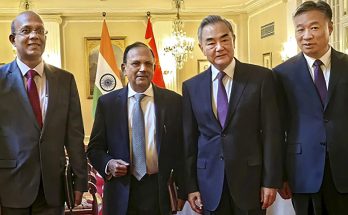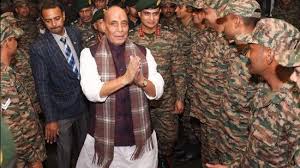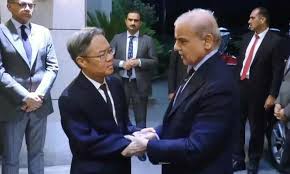 Days after North Korea trumpeted its successful testing of a hydrogen bomb, the United Nations has slapped the strongest-ever sanctions to punish the rogue regime in Pyongyang, with the larger aim of resuming six-party talks to denuclearize the Korean peninsula.
Days after North Korea trumpeted its successful testing of a hydrogen bomb, the United Nations has slapped the strongest-ever sanctions to punish the rogue regime in Pyongyang, with the larger aim of resuming six-party talks to denuclearize the Korean peninsula.
The 15-member United Nations Security Council approved new sanctions after the US struck a deal with China and Russia, veto-wielding members of UNSC and North Korea’s top economic partners, and relented on its demand for a total ban on oil imports. Washington abandoned its hawkish stance after China and Russia cautioned about dangers of taking a harsh stand.
The fresh sanctions have imposed limits on the imports of crude oil and oil products by North Korea. The punitive measures approved by the UNSC includes a ban on exports of textiles, Pyongyang’s second-biggest export worth more than $700m (£530m) a year, and limiting North Koreans from working overseas, which, according to the US estimate, would cut off $500m of tax revenue per year. The proposal to put an asset freeze on President Kim Jong-un was abandoned and the total ban on overseas workers was also reduced. The resolution did not press for implementing a ban on renewing the contracts of close to 100,000 North Korean guest workers, most of whom work in Russia’s far-east, and who repatriate salaries worth around $US500 million a year.
 China and Russia, key economic allies of North Korea, fear that harsher sanctions will only worsen the crisis and a regime collapse would be a major destabilizing force for the region. China has also expressed its concerns over the deployment of Thaad, the anti-missile defence system, that poses a security threat and will only push North Korea further towards its nuclear ambitions.
China and Russia, key economic allies of North Korea, fear that harsher sanctions will only worsen the crisis and a regime collapse would be a major destabilizing force for the region. China has also expressed its concerns over the deployment of Thaad, the anti-missile defence system, that poses a security threat and will only push North Korea further towards its nuclear ambitions.
After the vote US Ambassador to the UN Nikki Haley told the Security Council: “We don’t take pleasure in further strengthening sanctions today. We are not looking for war.” Analysts have observed that Trump’s unpredictable policy announcements would only end up limiting its influence globally as was demonstrated in the UN resolution where China and Russia remained firmly united.
The new sanctions are set to put onerous economic pressure on the deviant North Korean regime, but given President Kim’s mercurial way of functioning and his penchant for brinkmanship, it’s not clear whether this will work to bring Pyongyang to the negotiating table.
The North Korea nuclear threat will also figure in talks between Prime Minister Narendra Modi and his Japanese counterpart Shinzo Abe in Gujarat’s capital on September 14.
The UNSC has called for the resumption of six-party talks, which included North Korea, South Korea, China, Russia, Japan and the US, to negotiate a complete denuclearization of the Korean peninsula. The six-party talks collapsed in 2009.
Global support for fresh sanctions
“North Korea needs to realise that a reckless challenge against international peace will only bring about even stronger sanctions against them.” – South Korean presidential office spokesman
“If our participation in talks is wanted, I will say yes immediately…I could also imagine such a format to settle the North Korea conflict.” – German Chancellor Angela Merkel
“We think it’s a big mistake to underestimate this Russia, China initiative. It remains on the table at the Security Council and we will insist on it being considered.” – Russia’s UN ambassador Vassily Nebenzia
“We are facing not a regional but a global threat, not a virtual but an immediate threat, not a serious but an existential threat. This threat is what unites us in the Security Council and, I hope, what will bring us towards unity when it comes to the vote and hopefully beyond….The stronger the sanctions we impose on North Korea, the stronger our hand in promoting a political solution – by definition, this is a compromise in order to get everyone on board”. –
Francois Delattre, the French envoy to the UN
“First of all, these are significantly tougher sanctions. Secondly, you’re right that sanctions take time to have an impact, but it’s only over the last year or so that the Security Council has been sanctioning sectors of the economy”.
UK’s ambassador to the UN Matthew Rycroft
(Pritha Mahanti contributed inputs for this article)
Author Profile
- India Writes Network (www.indiawrites.org) is an emerging think tank and a media-publishing company focused on international affairs & the India Story. Centre for Global India Insights is the research arm of India Writes Network. To subscribe to India and the World, write to editor@indiawrites.org. A venture of TGII Media Private Limited, a leading media, publishing and consultancy company, IWN has carved a niche for balanced and exhaustive reporting and analysis of international affairs. Eminent personalities, politicians, diplomats, authors, strategy gurus and news-makers have contributed to India Writes Network, as also “India and the World,” a magazine focused on global affairs.
Latest entries
 India and the WorldApril 23, 2025Kashmir terror: India hits back at Pakistan, highlights cross-border linkages
India and the WorldApril 23, 2025Kashmir terror: India hits back at Pakistan, highlights cross-border linkages India and the WorldApril 23, 2025The Century of America and India: Growing Together
India and the WorldApril 23, 2025The Century of America and India: Growing Together In ConversationApril 20, 2025India Can Contribute Largely to Development of Morocco’s Defence Industry: Ambassador
In ConversationApril 20, 2025India Can Contribute Largely to Development of Morocco’s Defence Industry: Ambassador India and the WorldApril 2, 2025Mapping Next Steps for BIMSTEC
India and the WorldApril 2, 2025Mapping Next Steps for BIMSTEC







